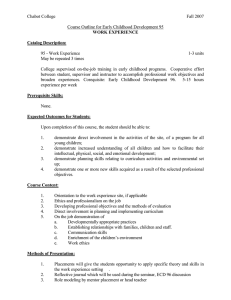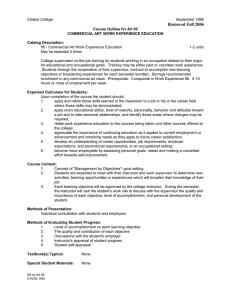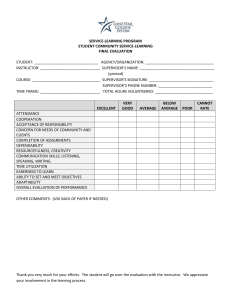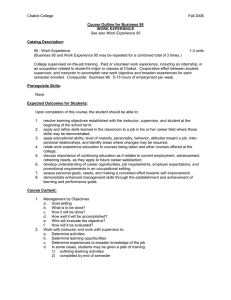Chabot College Fall 2001 Course Outline for Early Childhood Development 95
advertisement
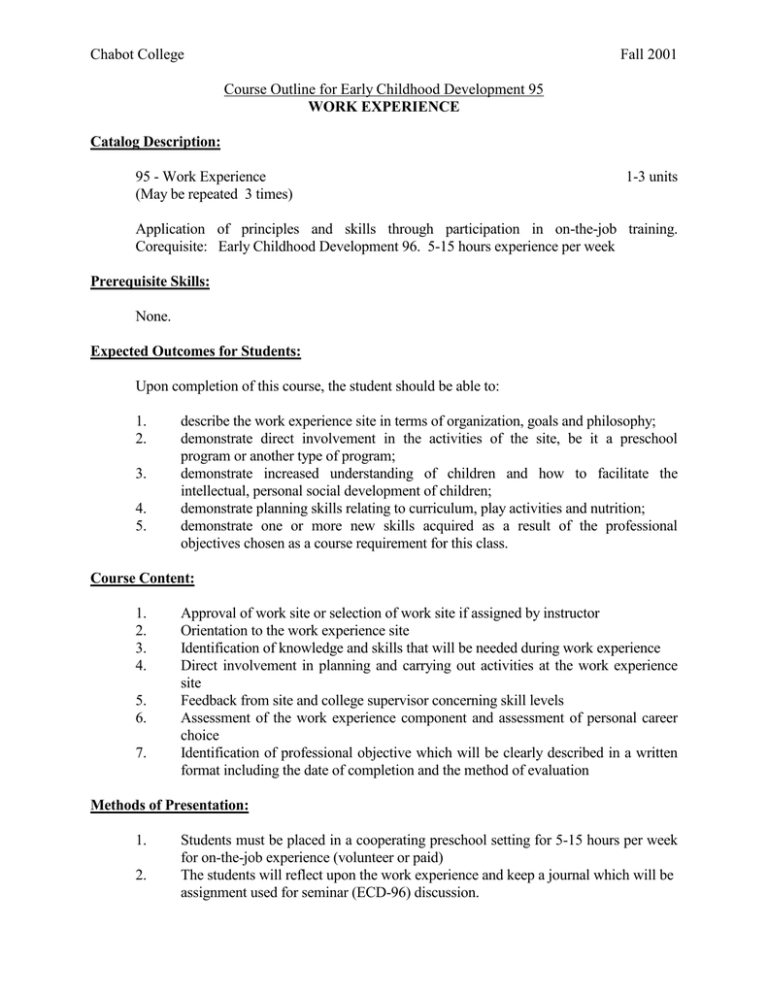
Chabot College Fall 2001 Course Outline for Early Childhood Development 95 WORK EXPERIENCE Catalog Description: 95 - Work Experience (May be repeated 3 times) 1-3 units Application of principles and skills through participation in on-the-job training. Corequisite: Early Childhood Development 96. 5-15 hours experience per week Prerequisite Skills: None. Expected Outcomes for Students: Upon completion of this course, the student should be able to: 1. 2. 3. 4. 5. describe the work experience site in terms of organization, goals and philosophy; demonstrate direct involvement in the activities of the site, be it a preschool program or another type of program; demonstrate increased understanding of children and how to facilitate the intellectual, personal social development of children; demonstrate planning skills relating to curriculum, play activities and nutrition; demonstrate one or more new skills acquired as a result of the professional objectives chosen as a course requirement for this class. Course Content: 1. 2. 3. 4. 5. 6. 7. Approval of work site or selection of work site if assigned by instructor Orientation to the work experience site Identification of knowledge and skills that will be needed during work experience Direct involvement in planning and carrying out activities at the work experience site Feedback from site and college supervisor concerning skill levels Assessment of the work experience component and assessment of personal career choice Identification of professional objective which will be clearly described in a written format including the date of completion and the method of evaluation Methods of Presentation: 1. 2. Students must be placed in a cooperating preschool setting for 5-15 hours per week for on-the-job experience (volunteer or paid) The students will reflect upon the work experience and keep a journal which will be assignment used for seminar (ECD-96) discussion. Chabot College Course Outline for ECD 95, Page 2 Fall 2001 Assignments and Methods of Evaluating Student Progress: 1. Typical Assignments a. Students will be directed at the work site by the site supervisor. The variety of sites and assigned tasks are myriad. In all placements students will be involved with: 1) the children 2) the program 3) the curricula 4) staff-relations 5) maintaining the environment 6) contact with parents 7) communicating with the site supervisor b. "Management by objectives" requires the students to select three objectives that will be completed during the work experience period, which will stretch them professionally and give them the opportunity to do new, creative and challenging assignments that they have not previously undertaken. These must be completed as designed by the time-line the students establish. 2. Methods of Evaluating Student Progress a. Completed objectives will be evaluated by the site supervisor, the college instructor, parents of children served by the program, other staff, etc. b. On-site interview between college supervisor, student and site supervisor c. Work ethic 1) no tardiness 2) no unexcused absenteeism 3) appropriate dress, manner and behavior for such work d. The following competencies will be evaluated and ranked: advanced; proficient, or needs improvement: 1) follows rules, policies, and operational procedures 2) aware of emergency and disaster procedures 3) applies child growth and development principles 4) demonstrates positive interaction, guidance, and discipline 5) plans and supervises developmentally appropriate activities 6) utilizes good nutrition, health, and safety practices 7) respects children and families with diverse needs and cultures 8) observes professional ethics e. Frequency of Evaluation: 1) The student-chosen objectives will be evaluated on the date indicated for completion in accordance with the student plan 2) The college instructor will visit the site around the middle of the semester placement and observe and evaluate the student 3) The college instructor will visit the site at the end of the placement and meet with the supervisor, at which time the student's performance will be discussed if possible with the instructor, site supervisor and student Chabot College Course Outline for ECD 95, Page 3 Fall 2001 Textbook(s) (typical): Working for Quality Child Care Unit II, Latest Edition, National Center for the Early Childhood Work Force, 1998 Special Student Materials: None. tf: A:\CURRICUL\FALL 00\ECD 95.DOC REVISED 11-15-00
